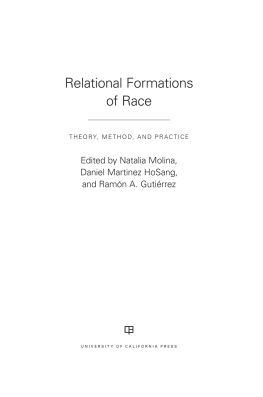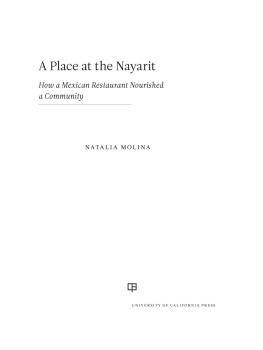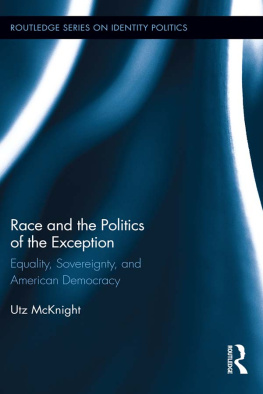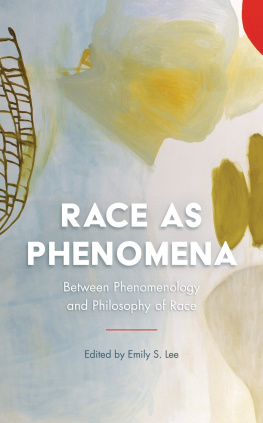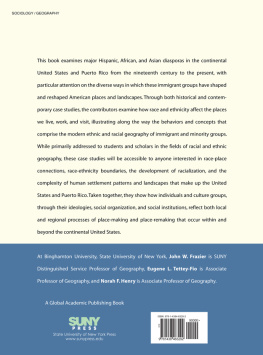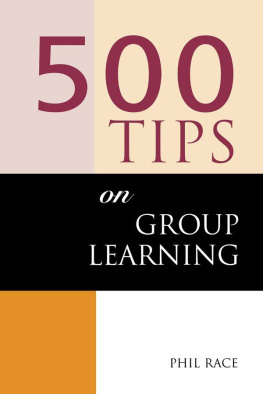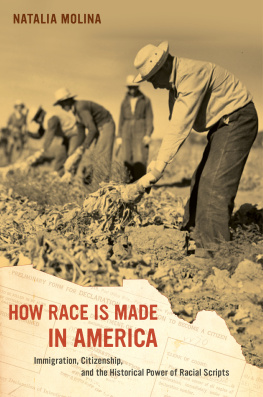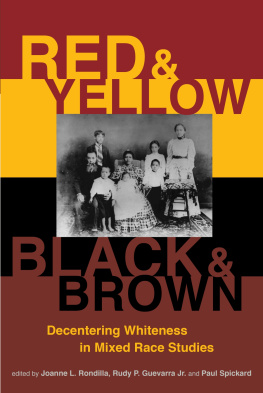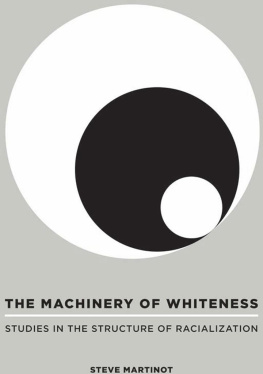0.1.
2.1.
2.2.
6.1.
8.1.
8.2.
10.1.
11.1.
11.2.
11.3.
12.1.
14.1.
14.2.
14.3.
ACKNOWLEDGMENTS
Barbara Tomlinson and George Lipsitz remind us that the structures of professional validation and reward in academic research often promote desires to be the one to have the first word or the last word on a particular subject or discourse. This fixation on innovation and authority, however, ignores the role of the middle word or building on what came before and setting the stage for what will follow. We understand this volume, Relational Formations of Race, and all the collaborative work that brought it to fruition, to be the kind of middle word counseled by Tomlinson and Lipsitz. As we describe in the introduction, the race concept itself has been relational from the moment it entered the political vocabulary of modernity; the drive to sort, rank, and compare is constitutive of colonialism and white supremacy itself. And the efforts to resist and transform these ways of knowing and being have also always been relational, witnessed in the practices and analyses of groups struggling for their liberation to find others whose freedom is linked to theirs. Following Lipsitz and Tomlinson, we hope this volume serves as a kind of accompaniment to this deep and wide-ranging body of knowledge and collective action.
Our editor at the University of California Press, Niels Hooper, originated the idea for this volume. As the editor of the presss American Crossroads series, Niels has a keen understanding of the relational dimensions of much of the work in contemporary ethnic and American studies, and of the contribution that a volume organized around such themes could make. Thank you, Niels.
The initial discussions with Niels led us to organize a conference, Studying Race Relationally, hosted by the University of Chicago in May 2016, that laid the groundwork for this volume. The dynamic conversations and enthusiastic response from presenters, respondents, and the audience sharpened our vision. We thank all the presenters who helped shape the discussions found in this volume: Eric Avila, Michael Dawson, Laura E. Enriquez, Roderick Ferguson, Claire Jean Kim, Julie Lee Merseth, Michael Rodrguez-Muiz, Catherine Ramrez, Antonio T. Tiongson Jr., Laurie Green, and Jeffrey T. Yamashita. The conference was generously supported by Chicago Universitys Center for the Study of Race, Politics and Culture (CSRPC), Franke Institute for the Humanities, and History Department. We also thank colleagues at the University of Chicago, including Marco Garrido, Larissa Brewer-Garca, and Edgar Garca. And thanks to Richard Jean So for providing thoughtful commentary at the conference, as well as to the CSRPC staff for their support in hosting the event.
The volume received generous institutional support from Yale University and the University of Oregon, as well as an Academic Senate Research Grant from the University of California, San Diego.
We are especially grateful to four readersEvelyn Hu-DeHart and the three who remained anonymouswho reviewed the initial manuscript for UC Press. Their in-depth knowledge of the field yielded insightful questions that pushed us to make the volume stronger.
Students in Daniel Martinez HoSangs Yale graduate seminar, Studying Race Relationally (Timothy Byram, Ambre Dromgoole, Alex Ikeuchi, Isadora Milanez, Hctor Peralta, Daniella Posy, Robbie Short, Alex Williams, and Alex Zhang) worked with an early version of the manuscript and related essays and shared their perceptive readings, questions, and suggestions. The introduction in particular benefited from their careful engagement. Jason Oliver Chang of the University of Connecticut also presented his generative work at the seminar, helping us think the role of state formation and transnational migration within a relational framework.
We are also indebted to our graduate student researchers, Alina Mndez, Ever Osorio Ruiz, Annie Titus, and Hctor Peralta, for their research, editing, and production acumen. Harold Colson, librarian extraordinaire at the University of California, San Diego, helped track down rare photos and documents, as well as many sources related to the nascent and quickly growing field of relational studies of race.
Isabella Furth is both an editor and interlocutor. We thank her for her editorial sharpness and probing questions.
Along with Niels Hooper, we would like to thank the extraordinarily resourceful and helpful staff at University of California Press. Editorial assistant Bradley Depew deserves special mention for his good counsel and for helping us decipher and navigate the ins and outs of the publishing world, from copyright permissions to pixel counts.
We would also like to give a special acknowledgment to George L. and George S. (Lipsitz and Snchez, respectively). Their scholarship and mentorship have been invaluable to us and to many of the contributors to this volume. Along with Kelly Lytle Hernndez, they took time out of their busy schedules to sit down and answer questions about the foundations of studying race relationally and about new directions for inquiry. That conversation, which yielded the roundtable discussion published in the first chapter of this volume, was a touchstone for our work. We are grateful for their accompaniment intellectual, personal, and professionalwhich has made this book possible.

